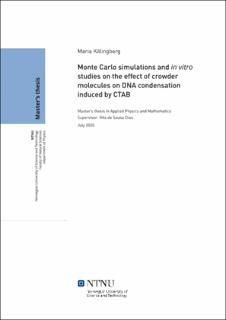| dc.contributor.advisor | Dias, Rita de Sousa | |
| dc.contributor.author | Killingberg, Maria | |
| dc.date.accessioned | 2021-09-28T18:38:19Z | |
| dc.date.available | 2021-09-28T18:38:19Z | |
| dc.date.issued | 2020 | |
| dc.identifier | no.ntnu:inspera:60760061:25743140 | |
| dc.identifier.uri | https://hdl.handle.net/11250/2785554 | |
| dc.description.abstract | Prokaryote celler mangler en nukleær membran som skiller DNA-et fra cytosol, men DNA-et er pakket til en struktur kalt nukleoiden. Bindingen av nukleoidassosierte proteiner og makromolekylær trengsel, som er forårsaket av den høye konsentrasjonen av makromolekyler i cellen, er to mekanismer som antas å regulere DNA-pakking i bakterieceller. Kationiske overflateaktive molekyl, slik som CTAB, samles i nærheten av DNA og induserer pakking, på samme måte som noen av disse nukleoidassosierte proteinene. Nøytrale polymerer blir ofte brukt ved undersøkelser av effekten av makromolekylær trengsel, men en stor del av makromolekylene i cytosolen er negativt ladet. Her ble effekten av negativt ladede lineære og forgrenede polymerer, og en nøytral lineær polymer (PEG), på DNA-pakking indusert av CTAB undersøkt. Dette ble undersøkt ved bruk av grovkornede Monte Carlo-simuleringer, og analyser av fargestoffekskludering, elektroforetisk mobilitetsforskyvning og DNase-beskyttelse.
Analysen viser at PEG svakt øker DNA-pakking med CTAB, spesielt ved høy ionestyrke. Negativt ladede trengselsmolekyler øker pakkingen av DNA på grunn av de elektrostatiske frastøtningene. I nærvær av CTAB konkurrerer trengselsmolekylene med DNA om CTAB, som senker interaksjonenen mellom DNA og CTAB, og hindrer pakking av DNA. Denne effekten ble funnet å være høyere for det lineære enn det sfæriske trengselsmolekylet, som ble bekreftet med Monte Carlo-simuleringer. Disse forskjellene ble enda mer fremhevet ved en økning av saltkonsentrasjonen, hvor den sfæriske polymeren nesten ikke påvirket pakkingen av DNA med CTAB.
Resultatene antyder at negativt ladede sfærisk-lignende makromolekyler i cytoplasma av bakterieceller ikke motvirker, og potensielt forbedrer pakking av DNA og dannelsen av nukleoiden. Lineære negativt ladede makromolekyler forventes å konkurrere mer med DNA om proteiner med lav spesifisitet og affinitet så vel som andre positivt ladede molekyler, noe som motvirker pakkingen av DNA. | |
| dc.description.abstract | Prokaryotic cells lack a nuclear membrane that separates the DNA from the cytosol, but the DNA is condensed into a structure called the nucleoid. The binding of nucleoid-associated proteins (NAPs) and macromolecular crowding (MMC) arising from the large concentration of macromolecules in the cell, are two mechanism believed to regulate DNA condensation in bacteria cells. Cationic surfactants, such as CTAB, self-assemble in the vincinity of DNA inducing its condensation, similarly to the condensing effect by some of the NAPs. While the majority of the published work dealing with MMC focus on neutral polymers, a large fraction of the macromolecules in the cytosol are negatively charged. In this work, the effects of negatively charged linear and branched polymers, as well as a neutral linear polymer (PEG), on DNA condensation induced by the cationic surfactant CTAB are investigated. The effects were investigated using coarse-grained Monte Carlo simulations, dye exclusion, electrophoretic mobility shift, and DNase protection assays.
Under the studied conditions, PEG weakly enhances DNA condensation by CTAB, particularly at high ionic strength. Negatively charged crowders enhance the condensation of DNA, due to the electrostatic repulsions. In the presence of CTAB, the crowders competes with the DNA for the binding to CTAB and DNA condensation is hindered. This opposing effect was found to be more evident for the linear than the spherical-like crowder, which was confirmed by coarse-grained Monte Carlo simulations. Increasing the salt concentration further highlighted these differences, with the dendritic polyanion nearly not affecting DNA condensation by CTAB.
These results suggest that negatively charged spherical-like macromolecules in the cytoplasm of bacterial cells do not interfere with, and can even potentially contribute to, the DNA condensation and nucleoid formation. Linear negatively charged macromolecules are expected to compete with the DNA for proteins with low specificity and affinity as well as other positively charged co-solutes, leading to the decompaction of DNA. | |
| dc.language | | |
| dc.publisher | NTNU | |
| dc.title | Monte Carlo simulations and in vitro studies on the effect of crowder molecules on DNA condensation induced by CTAB | |
| dc.type | Master thesis | |
